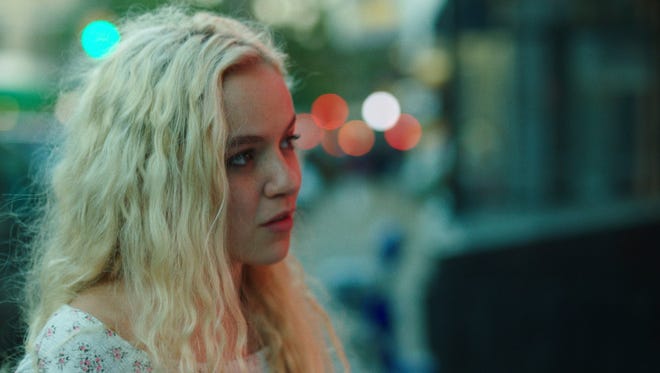Why 'White Girl' is one of the year's most divisive films

Morgan Saylor was shooting the upcoming nun drama Novitiate when she brought White Girl to January's Sundance Film Festival. It was a strange dichotomy to say the least, considering that in the latter, she strips down as a wild, drug-addled college sophomore who starts selling cocaine to break her boyfriend out of jail.
"That was very funny, to literally be in a habit on set and then go to this premiere," says Saylor, 21, who appeared in Showtime's Homeland as Nicholas Brody's petulant teenage daughter, Dana.
"We like to say she went from one habit to another," jokes writer/director Elizabeth Wood.
It ain't easy being a TV drama teen
White Girl (in theaters Friday in New York, expands to 200 screens nationwide throughout September and October) provoked walkouts and divided critics when it made its debut in Park City, Utah. With 78% positive reviews on aggregate site Rotten Tomatoes, the film was praised by The Hollywood Reporter's Leslie Felperin as "squalid, shocking and sexy as hell," comparing it to screenwriter Harmony Korine's similarly provocative coming-of-age Kids two decades ago. Variety's Peter Debruge, meanwhile, dismissed it as a "cesspool of reprehensible behavior," docking heroine Leah (Saylor) for being "so idiotic in her life decisions that the worst possible outcomes start to feel predictable."
In one of the film's bleary party scenes, for instance, Leah stumbles into a nightclub bathroom with her internship boss (Justin Bartha) and snorts a line of coke off his genitals. Later, when she is passed out drunk, she is raped by the lawyer (Chris Noth) defending her boyfriend Blue (Brian 'Sene' Marc), a low-income Puerto Rican bad boy. But when Blue is arrested for selling drugs, with no family or resources to bail himself out, Leah is forced to reconcile with her own white female privilege: leveraging sex and her parents' pockets to get the money she needs.

Wood laughed when she read Debruge's review. "I had no idea how people were going to respond, and I thought, 'Wow, maybe this is it,' " she says. "Luckily, most people were able to see past the sexuality and see that this film engages with conversations about race, privilege and gender."
Girl, which distributor FilmRise opted to release unrated, is loosely inspired by Wood's own experiences as a young woman in New York. Writing the script, she was particular about not giving Leah a backstory to justify her behavior. "If it were a male character having sex and doing drugs, you'd never need, 'Oh, was he abused? Did he come from a difficult background?' " says Wood, 33. "My goal is to tell stories where women get to do the same things men do."
What's next for everyone's favorite angsty 'Homeland' teenager, Dana Brody?
Saylor, who studies math at the University of Chicago, was equal parts scared and intrigued by Leah's messiness. "I wrote back to my agent, 'I definitely want to see this film, whether I'm in it or not,' " Saylor says. While she had some trepidation about her first onscreen nudity, "it was being handled in a way that was truthful. I didn't feel like it was going to be trashy."
That doesn't mean it's for everyone, though. Saylor told her parents not to watch, although "my brother saw it and my friends are starting to, which is nice. It does feel very different than me, so people are able to (just) see it as a film."
